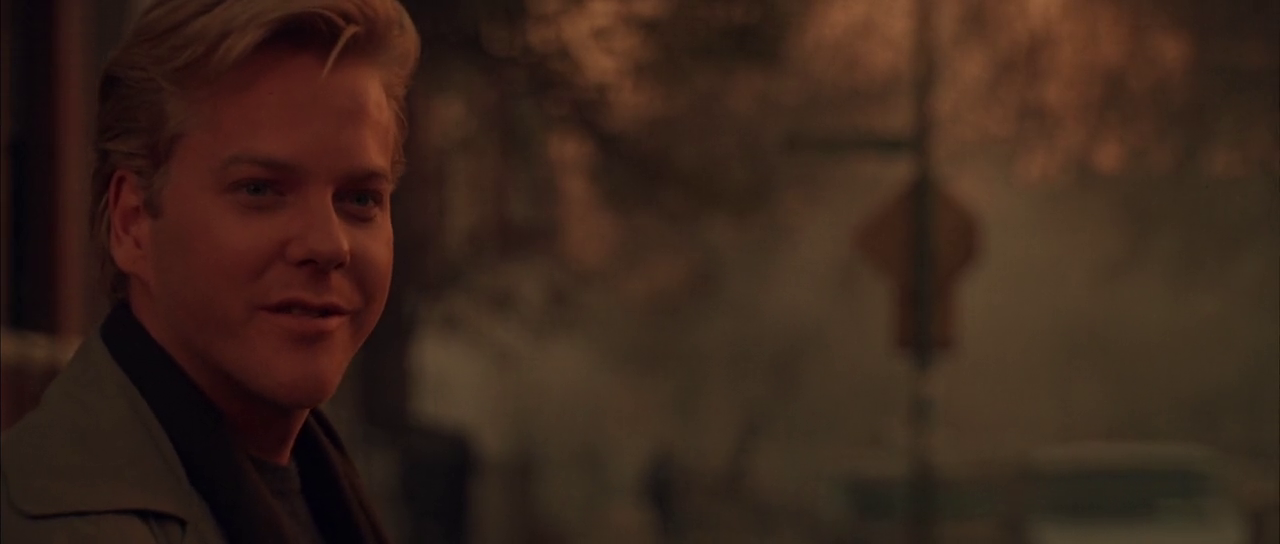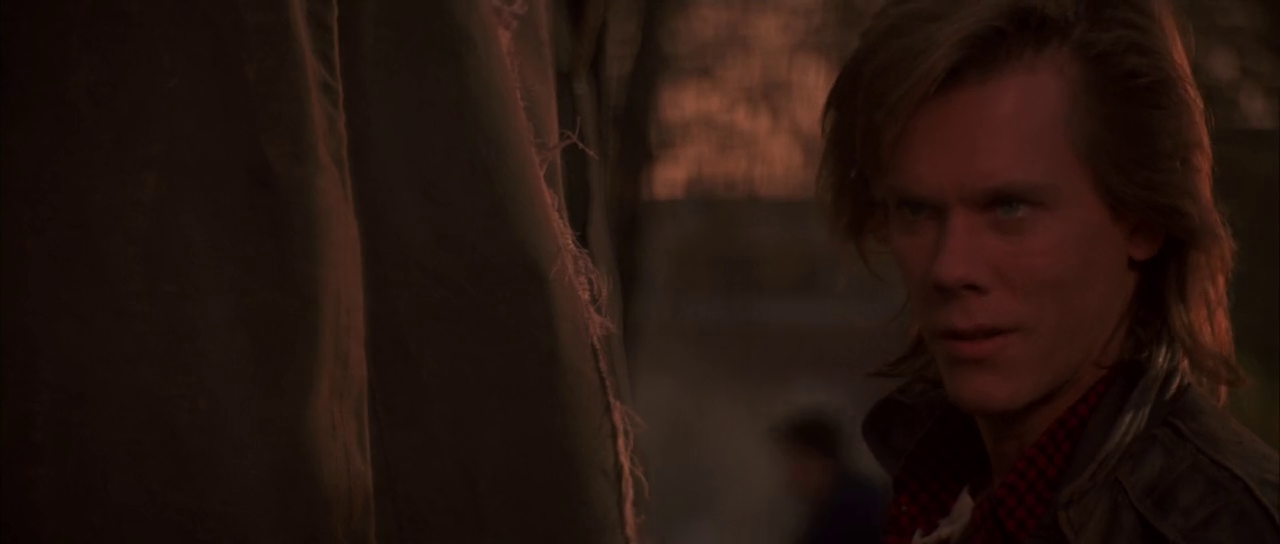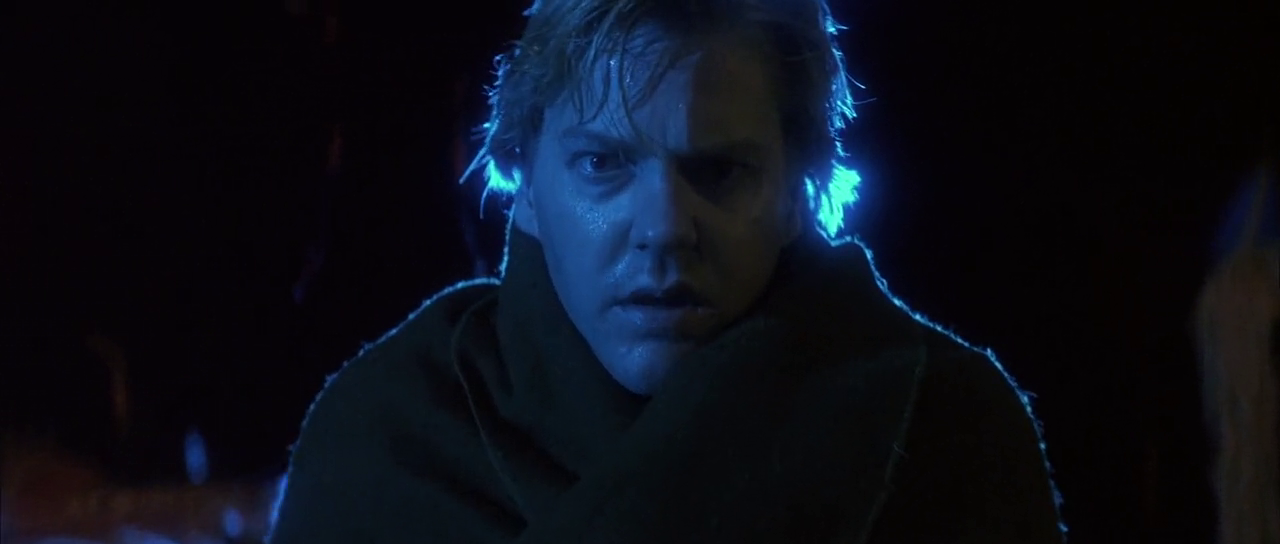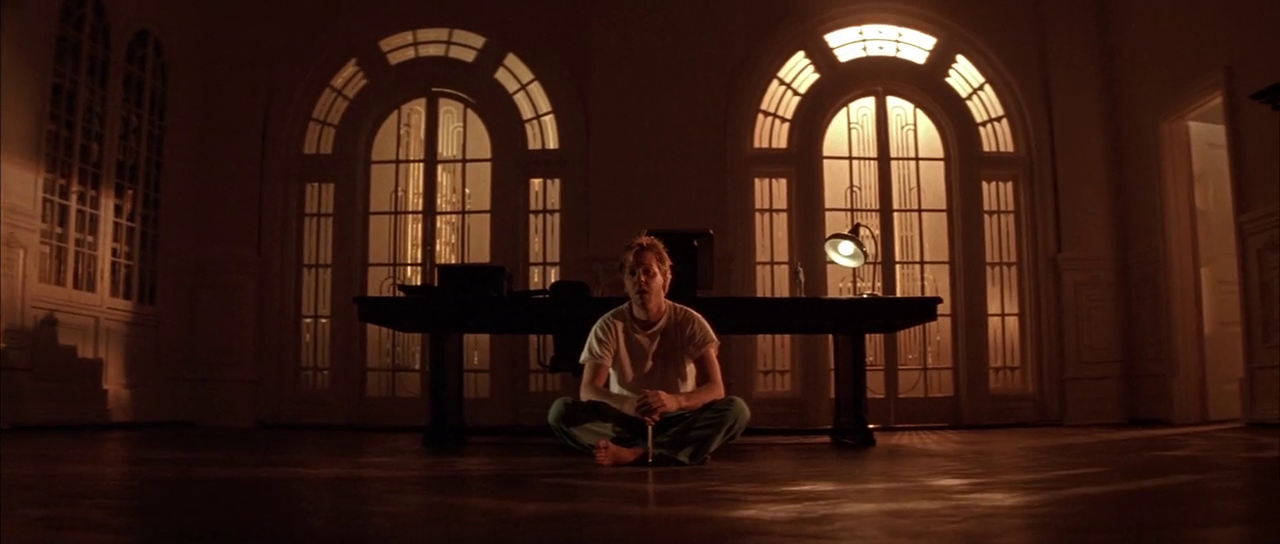Flatliners (1990)
written by: Peter Filardi
starring: Kiefer Sutherland, Kevin Bacon, Julia Roberts, William Baldwin, and Oliver Platt
It's hard for me to know where to begin on this one. Since first watching it in September as part of a scientific experiment to discover if I actually found young Kiefer Sutherland attractive, I have started to say to people, inscreasingly without irony or hesitation, that Flatliners is my favorite movie of all time. I have watched it four times already this year. I watched it twice on New Year's Day. I know that sounds insane, but I think you're saying that because you haven't seen it or maybe you don't know me very well. Because, honestly, Flatliners is a perfect movie for me and I am an obsessive. Yet, the more I force other people to watch it, the more I think it's genuinely good too. It's a smart, strong genre exercise, a tense thriller and a morality tale on a Gothic stage. It's the best Schumacher I've seen so far-- a rich script perfectly complimented by his wonderful heightened vision, which, yes, means lots of neon colors and emotional lighting and dramatic wind. In other hands, Flatliners would have been at best a melodramatic medical drama. In Schumacher's hands, it becomes a fable and a fantasy in the greatest style.
On paper, the movie may sound stupid and campy, I grant-- a group of sexy young medical students decide to explore that undiscovered country we call death by killing themselves. Then, their colleagues bring them back to life so they can report on what they experienced. Four of them cross the line between life and death, and each have something come back across with them... bum bum bumm. Okay, a little schlocky, a little goofy. It could pretty easily veer into being nothing more than a stupid horror movie (which is unfortunately what the 2017 remake crosses the line into, but we'll say no more about it as it is bad and a slight upon the good name of Flatliners). But in action and in Joel Schumacher's hands, it takes those elements and drenches them in a style and an earnestness that make it not only palatable but successful as a drama. His touch elevates the material. It's the earnestness and honesty with which these nearly fantasy elements are presented that gives the movie weight. For every silly plot turn or out-there idea, there is a grounded character moment or performance to bring the film back down to earth. That's what I love about it, I think-- how it balances those two sides of itself. That's why I can love it, and not just find it silly.
Flatliners, which came out in July of 1990, a mere month after I was born, is to me the perfect version of a Joel Schumacher movie. A Gothic fantasy and a moral fable, it stands a level above, perfectly matched to his style and abilities. It's not his best known movie, not by a long shot, and I can't find a single recent critical piece on it. But, for me, Flatliners does deserve something more than it's been given. That's why I keep pushing it on people. I understand completely why it hasn't attained the cult status of something like The Lost Boys-- It doesn't have quite the same cool factor, or the soundtrack, or the teen aspect which draws people in young and keeps them. The stars of Flatliners are young (Kiefer Sutherland, a baby at 24), but the film is an adult drama, definitely, steeped in heavy Gothic themes: Death, the inescapability of the past, atonement, repentance. Death is all around us, Flatliners knows, and you can't avoid your past, nor can you escape it; Your past, and death, must both be faced. These heavy, dramatic ideas are coupled with heavy, dramatic atmosphere in the Gothic style-- roaring rainstorms and ghosts, griefs and guilts, wind and drama and emotional tumult, all in a series of grand, empty halls full of drafts and blowing fabric.
The film starts strongly focused on Kiefer as Nelson Wright, an arrogant, sharp student who has built a reckless after-hours lab and maneuvered his friends into helping him. He immediately comes across as brash, cocky, and utterly sure of himself. He flatters the ego of Randal Steckle (Oliver Platt in a series of very charming bowties), appeals to Rachel Manus's (Julia Roberts, gorgeous) competitive side and their tense prior history; he dares Joe Hurley (William Baldwin) to have some balls. Finally, the finishing touch, he manipulates his ostensible best friend, David Labraccio (Kevin Bacon, really glamorous and wholesome), by calling on their friendship and David's innate need to help people. He's clever enough to know how to get otherwise smart, responsible medical students to do something insane with him. I honestly love Nelson Wright as a creation-- not because of these arrogant, manipulative early Mad Scientist scenes, but more because of how he degenerates over the course of the film into a desperate mess of a damsel in distress who needs to be rescued, and how much that desperate mess is present from the beginning. He has this dichotomy within him, and I love him for it. His fragility is totally apparent early on, played as an undercurrent, which I so appreciate. The early brashness is tempered by a shot where he looks in the mirror before the first flatline, and there's a fear in his eyes and a tremble in his cheek. Even as he starts to deteriorate, his cockiness and fragility go hand in hand. The more vulnerable he gets, the more he lashes out. It's a mask, and it's crumbling, even as he tries to keep it in place. It's beautiful, well performed, and given the room to exist. Again, that's what I love about Kiefer as an actor-- his ability to pair vulnerability with toughness, and to present vulnerability hidden beneath toughness, which is all Nelson is. He's wobbly at best, pretending to be marble.
As in The Lost Boys, what makes Flatliners work is grounded characters and emotional beats in a heightened world. The color palate of the world can shift abruptly from normal tones to extreme bright reds and blues, but the fear our characters feel is real, from Nelson's bone-rattling terror to Rachel's guilt-drenched sick-scare. Those genuine feelings carry us across the stylization. It's the performances that ground this silly little movie, and make it affecting and effective. You have to have that grounding, which perhaps gets lost in later Schumacher ventures, but here is present and perfectly balanced.
So Nelson gets his friends to kill him. Why does he do it? For no better reason than because he can. Because he came up with "an idea so simple, so brilliant, you only get one in a lifetime," and it took hold. It doesn't seem to be anything much more complicated than that-- where Rachel has an obsession with death due to a trauma in her childhood, Nelson doesn't seem to have the same weighty guilt hanging over his daily life from his own childhood trauma. He just wants to do it because he can, because the idea is that good. Like Victor Frankenstein, he leaps in without really considering the consequences.
But it works and they bring Nelson back from the dead. The science of it is probably wrong, and crazy, but I sure don't care because I am not a doctor and therefore don't know shit about medicine. It seems real enough to be believable and it's easy to follow, and that's about all I need.
In his review, Roger Ebert (who generally liked the movie!) says that it's a shame we have to go through the same crisis so many times. I hear that, and while it's true we do have to watch as each of our characters flatline and their peers struggle to get them back, I'm impressed by how each flatline scene has a different internal tension. For me, that keeps each crisis fresh. Though there's never a lot of concern that any of our leads will actually die on the table (until the very end, at least), there are other things at play. The first flatline is the most straightforward, as it should be. The process has to be explained to the audience-- then there's tension about whether or not they'll even go through with the experiment, and once they do, getting Nelson back that first time isn't easy. Getting Joe back is slightly more difficult, but the tension exists in Nelson's dented pride-- his emergency skills aren't as honed as David's and it gets under his skin that he can't get Joe breathing again. He won't let other people step in when he can't bring Joe back himself; it bruises him. With David, the third flatline, the tension of Nelson's wounded pride ramps up into a full on bitchfest between Nelson and Rachel, as Nelson snipes at her in this petty, ugly way while David is under-- "What if he didn't make it back?" he sneers even as he teases that he'll leave David dead longer than they agreed on. "Would you miss him, Rachel?" There's a fear that his increasingly tattered ego (amplified by constantly getting his teeth kicked in by a ghost kid) will lead to a critical, fatal mistake.
Mostly, each flatline sequence is tense and then it's triumphant. And then, you know, the ghosts arrive to ruin everyone's good time.
Because yes, also there are ghosts. It's part of the Gothic thing. The ghosts add to the eerie atmosphere, following and haunting and attacking to varying degrees. Maybe you interpret them as self-inflicted guilt visions without physical form, but I like to choose to believe they're real, and physical, and pissed. Joe's ghosts (of the women's he's terribly wronged by being a total pig) are oppressive but not violent; Nelson's ghost is very violent, from moment one. Nelson faces his ghost (a boy he bullied as a child whose death he accidentally caused) with genuine fear and shuddering guilt. We don't initially know who this kid is and it's part of the drama of the movie to eventually discover exactly what Nelson did that he needs to atone for, even, as he comes to feel, at the cost of his own life.
One of the things I really love about this movie is that it's so non-expository-- we aren't told anything about about our characters relationships or their dynamics. During David's flatline, the tension between Nelson and Rachel plays on a totally unspoken history between them, and the chemistry that has been visibly developing between David and Rachel. There are implications here and there in the script and well played moments that inform, but nothing is sure. I get the feeling Rachel and Nelson used to date, and there are a couple hints in that direction, but it's never explicitly stated. Yet the underlying dynamic is there, adding layers to their scenes together-- Nelson's jealousy as David and Rachel start to like each other, his bitterness, his reaction to Rachel before going under ("One more kiss goodbye?") and his response to her the morning after ("Twenty-four hours ago I bet you didn't think you'd be spending the night here.") That stuff works so so well for me and I love getting to guess and fill in the gaps myself. Same goes for Nelson and David-- their shared references and comfort with each other go unremarked upon, but play easily. They're friends in a way they're not friends with Joe and Steckle. I'm always struck by David's comment before going under to Nelson: "Don't let go of the rope." We know Dave is a rock climber and we know what he means by that statement, but it comes with baggage we don't know about. That's cool, and I like the lived in quality to it. Same with Nelson finishing Dave's sentences once in a while-- they're friends in a way that's not new to them and isn't explained to us. It's smart and unpretentious, presented with a trust in the audience I really admire.
Obviously I have something to say about every aspect and every moment of this movie, and could really go to town. But probably what most people will grasp onto is the haunting, ghoulish atmosphere of the film. They are right to do so. It's eerie and spooky, beautifully shot and earnestly presented. A stunning, stylish exercise. Schumacher frames scenes in grand medical halls like it's 1890. Surgery is something messy and bloody, not clean and sterile in the modern style. Faces are lovingly captured, bonfires glow like oil paintings. This movie, like all good horror and all good Schumacher, exists slightly skewed from reality, and so there is room for gorgeous shots and interesting color and lighting choices. I've never seen a movie use hot reds in the way Flatliners does. Coupled with the icy blues that coat most of the ghost sequences, you get a harsh, blinding dichotomy. It takes most of the movie to figure out what it means-- blue is bad, red is good, and it's linked to the colors of the heat blanket that the characters use to raise and lower their body temperature during the experiments. Blue is cold death, red is warm life, but in so many movies (including The Lost Boys and St. Elmo's Fire), red is a nightmare color, symbolic of a bloody kind of chaos. That's part of the trick Flatliners pulls-- you know sharp bright coloration means something's coming, something probably bad, something out of this world. The difference between red and blue isn't initially apparent, and it plays on your preconceived notions of color use to play up the trick. Sometimes even within scenes we get this color differentiation-- Kevin Bacon bathed in warm pink light talking to Kiefer Sutherland, tinged a cool blue in the reverse shot. It's subtle and it's cool. Then, when it's not subtle, that's cool too. Because the subtle stuff is there, the world is primed for the more extreme slides. Sometimes the world just goes red, or blue, all of the sudden like someone adjusting a slide scale. Blue. Red. Then, like letting out a breath you forgot you were holding, the color bleeds out to a saturated middle ground that's close to real life, but richer.
(Look at those beautiful, symmetrically framed shots. Damn Joel, nice work.)
Of course, there's the scenery-- these big Gothic halls, the murals of the mythic history of medicine, draped in torn and fluttering tarps for most of the movie (until life triumphs and renewal is possible, like damn, that's not subtle but in that moment it shouldn't be and it's great). Why would anyone decide to do a medical experiment in a building that is under renovation and clearly leaks in the rain?? For the drama. It's that level of dramatic flair that makes Flatliners so good-- it's the commitment to the extra-ness of it all. This is a movie where the power of love overcomes death. To achieve that kind of plot point and have it not feel totally ridiculous, you have to commit to it and believe in it without reservation. Without that commitment, the movie would fall flat and feel shallow, or too winking. It leans hard into what it is and soars-- it's got so much to it-- so much whirling camera motion, symmetrically framed shots, indoor wind, bright graffiti of ghoulish faces, fog and dripping water and perfectly placed bruises and crackling leaves and-- it manages to work. It's earnest and sincere and that's the key. This movie, and Schumacher, is nothing if not utterly and completely sincere. Like, this movie takes place on during the week of Halloween! It's doesn't have to, but it does and that is So Much! That's so unnecessary. But it's a perfect setting for a ghost story-- the time of year when the veil between life and death is at it's thinnest. It's another detail that enriches the movie, making it more than schlock, and the film commits to it without any eye-rolling or self-consciousness. It just goes full out. What emerges is a movie that is dramatic, yes, but smart, unpretentious and visually rich.
That utter commitment means that when David realizes the way to rid themselves of the ghosts that are haunting them is to expiate and atone, it makes sense. It feels right. That's the Gothic answer here-- it's not about science, it's about what's in our hearts. Everything matters, Rachel. Everything we do matters. Nelson, shattered and raw, decides the only way for him to make amends is to kill himself. He flatlines, alone, with no intention of coming back. Every time it wrings my heart out. Help him, I cry! For god's sake, someone help him! I care about him, for all his nastiness and petty bitchiness and arrogant meanness. He doesn't deserve to die, a feeling the movie and I both agree on. It's cathartic, then, when he confronts his past without his mask of strength and surety on, and is forgiven. It feels good to see this character be saved. And that it happens in this dreamscape of wind and white light is so appropriate. The cuts back and forth between Nelson in the afterlife, blustered and buffeted by wind, and the rest of our heroes in the darkness of their lab, as wind cuts through for no reason but to tie these scenes together, desperate and ragged, with dutch angles and howling declarations-- hell, it's great stuff. It's the peak of what the movie has to offer, the culmination of all the heightened visuals and heightened emotions.
I love this movie. It takes what it has to offer and offers it with love and care, and in perfect taste and style. It's gaudiness is elegant. It's fully fleshed and totally unreal simultaneously-- the ghost element works for me, the human element works for me. Everything about how the movie looks and feels works fantastically for me. And on top of that, the Gothic themes totally land and the cathartic finale provides genuine emotional relief for me. And god, the final line of the movie is a whispered, breathy "Thank you." Thank you for saving me, thank you for not turning your back even though I was a jerk. That sort of sentiment, plainly presented and openly accepted, is the core of Flatliners for me. It's kind, it's cathartic, it's exactly the kind of ending you want for a Gothic ghost story.
Overall: ★★★★★
Schmacherness: ★★★★★
Up next: Dying Young (1991)





















